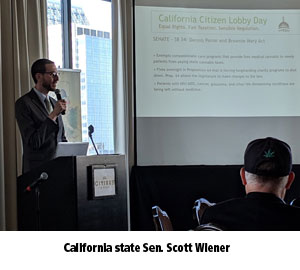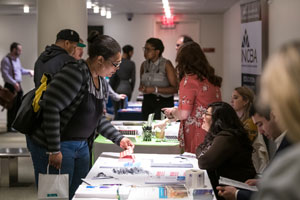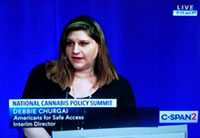ASA Activist Newsletter - May 2019
In the May 2019 Issue:
- ASA Co-founder Named President of International Research Institute
- Veterans Move Closer to Safe Access with New Congressional Strategy
- California Lobby Day Brings Advocates to Sacramento
- Upcoming ASA Events and Appearances
- Activists of the Month: Rylie and Janie Maedler
- Action Alert: Send Comments on CBD to the FDA
_________________________
ASA Co-founder Named President of International Research Institute

Americans for Safe Access announced this month that ASA co-founder Steph Sherer will serve as President of the International Cannabis and Cannabinoids Institute (ICCI) in Prague, Czech Republic. Sherer will provide vision and fundraising leadership as President of the ASA Board and will continue to work alongside Debbie Churgai, ASA’s Interim Director.
ICCI was co-founded by Sherer in 2015 as a joint project of patient organizations, scientific societies, and American investment company Dioscorides Global Holdings. Since then, ICCI has become a recognized Center of Excellence that works closely with international governments, universities, and research institutes as well as companies in cannabis, hemp, bio-tech, and agricultural sectors to strengthen the medical cannabis industry.
“We are excited that Steph has decided to focus more on ICCI in this next phase of her career,” said Dr. Pavel Kubu, the CEO of ICCI. “She has been a strong patient advocate and has a clear vision of the trajectory of the medical cannabis industry. I am dedicated to support ASA programs scaling to extend patient access globally.”
In her 17 years as executive director of ASA, Sherer helped to pass medical cannabis legislation and regulatory policy throughout the U.S. and built ASA into the largest nonprofit organization of patients, medical professionals, scientists, and concerned citizens promoting safe and legal access to cannabis for therapeutic use and research.

“Now that societal and governmental barriers to patient access to medical cannabis are breaking down, it is important that the industry evolves to provide products that are safe, standardized and targeted and that there is the scientific infrastructure to support these efforts,” said Sherer. “I am excited to expand the community of scientists, investors, and industry leaders committed to serving the patient community and expanding access to medical cannabis.”
Sherer built collaborative relationships with the American Herbal Products Association (AHPA) and the American Herbal Pharmacopoeia (AHP) to create the first medical cannabis industry standards in the areas of distribution, cultivation, analytics, manufacturing, packaging, and labeling. Sherer’s international work has focused on medical cannabis policies at the United Nations and within countries as a founding member of the International Medical Cannabis Patients Coalition (IMCPC).
“Sherer has helped to change the perception of cannabis among governments, organizations, and the general public at the national and international levels,” said ASA co-founder and Board Member Don Duncan. “As a pioneer in national and global medical cannabis advocacy, Steph has helped push the conversation forward in such a fruitful way that cannabis and cannabinoids are now generally considered as a medicine in most U.S. states and several countries around the world. We have no doubt that under Sherer’s leadership as ICCI’s President, the organization will be able to thrive in their efforts to bring additional evidence-based science to the medical cannabis field.”
More Information:
ICCI Press Release
Forbes Article
_________________________
Veterans Move Closer to Safe Access with New Congressional Strategy
![]() A trio of bipartisan bills that would help ensure safe access for veterans received hearings last month. The House Veterans’ Affairs Subcommittee on Health heard testimony on the VA Medicinal Cannabis Research Act of 2019 (H.R. 712), the Veterans Cannabis Use for Safe Healing Act (H.R. 2191), and the Veterans Equal Access Act (H.R. 1647). This hearing marks the first non-appropriations sub-committee hearing of the 116th Congress on the issue of veterans’ medical cannabis access.
A trio of bipartisan bills that would help ensure safe access for veterans received hearings last month. The House Veterans’ Affairs Subcommittee on Health heard testimony on the VA Medicinal Cannabis Research Act of 2019 (H.R. 712), the Veterans Cannabis Use for Safe Healing Act (H.R. 2191), and the Veterans Equal Access Act (H.R. 1647). This hearing marks the first non-appropriations sub-committee hearing of the 116th Congress on the issue of veterans’ medical cannabis access.
These bills are opposed by VA officials but supported by many Veterans Service Organizations, including the Iraq Afghanistan Veterans of America (IAVA), the Veterans of Foreign Wars, and Disabled American Veterans. According to a poll conducted by the American Legion, 92% of all veterans support research into medical cannabis and 83% of veterans support legalizing medical cannabis. IAVA conducted a similar poll showing that 83% of its members also support the legalization of medical cannabis.
The Veterans Equal Access Act would allow Veterans Health Administration (VHA) doctors to help veteran patients fill out medical cannabis enrollment paperwork in states with a medical cannabis program.
The VA Medicinal Cannabis Research Act would direct the Secretary of the VA to carry out clinical trials on the effects of cannabis on health conditions prevalent in the veteran community, including chronic pain and post-traumatic stress disorder.
The Veterans Cannabis Use for Safe Healing Act would prohibit the VA from denying benefits to a veteran who is participating in a state approved medical cannabis program. The VHA system serves over nine million veterans, but VHA doctors are prohibited from recommending cannabis. Veterans disproportionately suffer from conditions such as PTSD and chronic pain that are often treatable with medical cannabis.
"As the largest healthcare provider in the country, the VA must adopt policies to appropriately serve the needs of the veteran community, especially when it comes to providing access to medical cannabis," said David Mangone, ASA Director of Government Affairs. “After returning from war, America's heroes are faced with another battle at home against pills and suicide, and these bills would give them the tools they need to help win this battle by providing less dangerous, non-addictive methods for symptom management."
The VA bills are part of a new Congressional strategy on medical cannabis. Instead of tacking on amendments to appropriations bills for the Department of Justice (DOJ), medical cannabis champions in Congress are pursuing legislation that would not have to be renewed each year. As a result, spending bills are emerging from the House without medical cannabis language requested by bipartisan groups.
Federal raids and criminal prosecutions of patients and providers effectively ended after 2014, when Congress began adding budget riders that block the DOJ from interfering in state medical cannabis programs. A version of the amendment has been included in the appropriations bill each year since.
Rep. Earl Blumenauer (D-OR), one of the cosponsors of the amendment currently in effect, said before the midterm elections that he had developed a “blueprint” to pass comprehensive cannabis legislation. The Democrat’s latest policy retreat even included a panel on cannabis law reform. The result is full-fledged bills are advancing in the House.
In addition to the VA bills, a bipartisan bill to allow medical cannabis businesses to use financial services has been approved by the House Financial Services Committee. The Secure and Fair Enforcement (SAFE) Banking Act is cosponsored by 168 representatives, more than one-third of the House. The bipartisan Senate version, filed by Sens. Cory Gardner (R-CO) and Jeff Merkley (D-OR), has 20 cosponsors. The change is supported by banking groups, but the Republican chairman of the Senate Banking Committee, Mike Crapo (R-ID), has yet to commit to holding hearings.
Attorney General William Barr said in his confirmation hearing that he supported legislation that would allow state medical cannabis programs to operate in harmony with federal law.
More Information:
Video of the House hearing.
VA cannabis policies.
_________________________
California Lobby Day Brings Advocates to Sacramento
![]() The month of May kicked off with about 100 advocates gathering in Sacramento for the third annual California state lobby day, sponsored by NORML and Americans for Safe Access. After a continental breakfast, California state Senator Scott Wiener and Nicole Elliott, Senior Advisor on Cannabis to Governor Gavin Newsom, each addressed the group about developing rules and legislation.
The month of May kicked off with about 100 advocates gathering in Sacramento for the third annual California state lobby day, sponsored by NORML and Americans for Safe Access. After a continental breakfast, California state Senator Scott Wiener and Nicole Elliott, Senior Advisor on Cannabis to Governor Gavin Newsom, each addressed the group about developing rules and legislation.
Following that, attendees went to the capitol for pre-arranged meetings with lawmakers and their staffers about several pending bills. ASA and NORML are urging support for:
- SB 34 - To Protect Cannabis Compassion Programs in California
- AB 286 - To Temporarily Lower Cannabis Taxes
- SB 233 - To Allow Medical Cannabis Access in Schools
- AB 1465 - To License Cannabis Consumption Cafés and Lounges
- SB 305 - To Allow Qualified Patients Medical Cannabis Access in Healthcare Facilities
Other bills to provide tax relief to veterans purchasing medical marijuana, provide fee waivers to equity business applicants, and abolish the state narcotics offenders’ registry will also be presented.
After lobbying, participants completed feedback forms about their visits and their representatives’ positions on bills, which they turned in before attending a VIP reception for lawmakers that evening.
_________________________
UPCOMING ASA EVENTS & APPEARANCES
Webinar: Creating a Cascade of Care Model for Medical Cannabis
ASA’s free webinar on creating a Cascade of Care Model for medical cannabis patients has been rescheduled to Thursday, May 9 at 2pm. Technical difficulties prompted the change. The webinar with Grace E. Macalino, PhD, MPH, of Marimac Insight and ASA Interim Director Debbie Churgai, MA will discuss how the model can identify gaps in services, develop strategies to improve engagement in care, and increase health outcomes. Everyone from patients and caregivers to providers and policy makers will benefit from a clear and simple framework to guide future medical cannabis research, interventions, education, and resources. There will be an interactive follow-up webinar two weeks later for participants to share their stories. https://www.safeaccessnow.org/cascade_of_care_webinar
Improving the Standards of Cannabis as a Medicine
On May 22 in Philadelphia, ASA Interim Director Debbie Churgai will be moderating a panel on Improving the Standards of Cannabis as a Medicine at the Innovation in the Cannabis Industry event. The event considers what the US can learn from Israel about best practices, technology, and research from Israel. Sponsored by Greenhouse Ventures LLC and Philadelphia-Israel Chamber of Commerce, serving Pennsylvania, New Jersey and Delaware, the event will bring together international professionals, researchers, and investors. ASA newsletter subscribers can save 25% off the ticket price until May 12 when using code GHVASA at https://greenhouseventures.regfox.com/innovation-in-cannabis.
Cannabis Compliance West Summit
On Thursday May 30, ASA's William Dolphin, co-author of The Medicalization of Marijuana: Legitimacy, Stigma and the Patient Experience, will be part of a panel at the Cannabis Compliance West Summit on “Access and Delivery: Balancing Consumer Rights and Local Control,” along with the deputy city attorney of Los Angeles, the lead cannabis staffer for former Governor Jerry Brown, and the community impact director from TELOS. The 6th Annual Canna WEST Compliance, Testing & Safety Summit takes place May 29-31 at the Sofitel Beverly Hills in Los Angeles.
National Cannabis Policy Summit and Festival on 4/20
 Last month, ASA Interim Director Debbie Churgai, spoke during the National Cannabis Policy Summit in Washington, D.C. about the importance of medical cannabis advocacy, ending the stigma, and protecting free expression of cannabis communities while introducing the panel Cannabis in the Crosshairs: How do Big Media Companies Enforce “Community Standards” While Protecting Free Expression? The summit was aired live and can be watched at C-SPAN.org.
Last month, ASA Interim Director Debbie Churgai, spoke during the National Cannabis Policy Summit in Washington, D.C. about the importance of medical cannabis advocacy, ending the stigma, and protecting free expression of cannabis communities while introducing the panel Cannabis in the Crosshairs: How do Big Media Companies Enforce “Community Standards” While Protecting Free Expression? The summit was aired live and can be watched at C-SPAN.org.
ASA staff also contributed to two panels on 4/20 at the National Cannabis Festival and staff manned a table distributing information about safe access. Government Affairs Director David Mangone was on the “Key Barriers to Safe and Legal Access” panel and Regulatory Affairs Coordinator Sean Khalepari was on the East Coast Round Up panel.
_________________________
Activists of the Month: Rylie and Janie Maedler, Delaware
 Janie Maedler wasn’t planning on raising a medical cannabis activist. She just wanted the best possible treatment for her young daughter’s rare medical condition. But half a dozen years later, her daughter Rylie, now 13, has been instrumental in the passage of three medical cannabis laws in Delaware, one of which is named for her.
Janie Maedler wasn’t planning on raising a medical cannabis activist. She just wanted the best possible treatment for her young daughter’s rare medical condition. But half a dozen years later, her daughter Rylie, now 13, has been instrumental in the passage of three medical cannabis laws in Delaware, one of which is named for her.
Rylie’s parents first grew concerned when, as a seven-year-old, she began exhibiting unusual symptoms: first, what looked like a persistent cold, then a blocked nostril, then losing her teeth. After months of uncertainty, a CAT scan found an aggressive tumor attacking one side of Rylie’s face. Then, as she was being prepped for surgery and chemotherapy, a final bone biopsy came back negative. It wasn’t a malignant cancer, after all. Forty-seven tests later, doctors concluded it was a very rare form of tumor, aggressive giant cell granuloma. Surgery and chemotherapy were still the treatment, so the Maedler family began a complementary treatment with cannabis. Janie had done some research on what her young daughter was facing and had decided cannabis could be effective in fighting Rylie’s recurrent tumors.
A year later, in 2014, Rylie was speaking at Rotary Clubs and other groups, raising funds and support to start a nonprofit, Rylie’s Smile Foundation, for children suffering from rare diseases. Then she and her mother turned their attention to the Delaware legislature, campaigning for a medical cannabis law that would allow access for other children such as Rylie, who had now also developed a seizure disorder that cannabis extracts helped control, along with her tumors. After months of testifying at hearings and speaking to the media, Delaware passed “Rylie’s Law” in 2015, establishing legal access to medical cannabis on the recommendation of a pediatrician.
Rylie and her family soon discovered that there is more to safe access than passing a law. In Delaware, cannabis could not be brought on school grounds, so Rylie had to leave school each day to administer her medicine, crossing a bridge to meet her mother.
Then, there was the bomb threat.
“I didn’t know why she wasn’t at our regular spot and the regular time,” Janie says. “I had no way to know, and she had no way to tell me, that the school had moved all the students to a secure location.”
Rylie didn’t get her medicine that day, and had a seizure.
Delaware lawmakers were soon opening handwritten letters from Rylie explaining that she needed one more thing from them. She could make it across that bridge in a Nor’easter, even if the rain and lightning made it scary. But what about other kids? Kids with oxygen tanks or mobility problems? How were they going to get their medicine?
By the time Rylie was done lobbying, the state board of education and the state nurses association both supported the change unanimously, and in 2016 the legislature passed the bill. Rylie asked the then-governor, Jack Markell, to sign the bill at her school so the other kids could see why she’d missed so much school going to the capital. He obliged.
“Sometimes people will call me a “poster child,” Rylie says. “This bothers me so much because I work my butt off. My mom is an outspoken advocate, and I begged her to let me do this. When I was 11years old, we made some agreements that I had to take care of my health and grades first, but she and my dad would let me.”
In 2017, Janie and Rylie began trying to figure out how to add other conditions after hearing the story of a boy named Jonathan. Jonathan’s autism was not a qualifying condition in Delaware, but because it was severe enough to cause wasting, his parents were able to qualify him under that. The bill to go from a legislative process to a petition process for adding conditions stalled after passing out of committee in the summer of 2017. At the end of June, with two weeks left in the session, Janie started spending late nights at the capitol rallying legislators they’d built relationships with. At midnight on the last night of the session, “Jonathan’s Law” passed.
 Rylie’s nonprofit, Rylie’s Smile Foundation, filed a petition to add autism under the new law. At first officials balked at a blanket autism diagnosis, insisting on limiting it to “severe autism” or “autism with aggression.” Janie helped organize mothers of children with autism to come to the hearing and read off their children’s symptoms to lawmakers.
Rylie’s nonprofit, Rylie’s Smile Foundation, filed a petition to add autism under the new law. At first officials balked at a blanket autism diagnosis, insisting on limiting it to “severe autism” or “autism with aggression.” Janie helped organize mothers of children with autism to come to the hearing and read off their children’s symptoms to lawmakers.
“I told them, ‘If you pass it this way, I will file 20 more petitions for each type of autism,” Janie says.
In December 2017, Delaware added “severe debilitating autism.”
Last year, Rylie went back to Legislative Hall with a list of five things to work on, including opening qualifying conditions to what a doctor determines, allowing all licensed physicians to recommend for children, and requiring continuing medical education in cannabis to recommend. A competing bill made the politics challenging, but Rylie and Janie persist, even as Rylie’s advocacy goes global.
She appeared in Australia and Israel last year, will be in Hong Kong for a technology conference on market disruptors in October, and gave the keynote address at the Cannabis Science Conference East this spring.
“I have so much that I want to do and say. I felt like I could not be heard if I did not do this,” Rylie says. “There is a stigma in our own community that the pediatric patients are not heard, yet we are the ones who change so many laws.”
Meanwhile, the Maedlers have launched a pilot hemp project at their family farm in Virginia. If it goes well, they plan to have as much as 40 acres under hemp cultivation soon, with the hope of being able to provide other patients in need with free medicine.
_________________________
Action Alert: The FDA Needs to Hear from You on CBD
 The U.S. Food and Drug Administration (FDA) will hold a public hearing on May 31 on how to regulate CBD in products for human consumption such as foods, beverages, and dietary supplements. The FDA is also taking public comment on the issue into June. This is your chance to make an impact on important federal policy.
The U.S. Food and Drug Administration (FDA) will hold a public hearing on May 31 on how to regulate CBD in products for human consumption such as foods, beverages, and dietary supplements. The FDA is also taking public comment on the issue into June. This is your chance to make an impact on important federal policy.
ASA will be releasing specific comment guidelines in mid May, but you can read here ASA's general suggestions. Take action this month at www.safeaccessnow.org/fdacomment.
_________________________
Download a PDF of this newsletter to print and share
Share this page























